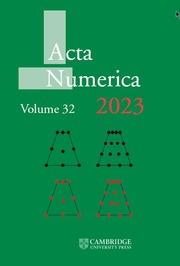Crossref Citations
This article has been cited by the following publications. This list is generated based on data provided by
Crossref.
Macdonald, Colin B.
Gottlieb, Sigal
and
Ruuth, Steven J.
2008.
A Numerical Study of Diagonally Split Runge–Kutta Methods for PDEs with Discontinuities.
Journal of Scientific Computing,
Vol. 36,
Issue. 1,
p.
89.
Butcher, J.C.
2009.
Order and stability of generalized Padé approximations.
Applied Numerical Mathematics,
Vol. 59,
Issue. 3-4,
p.
558.
Butcher, John
2009.
General linear methods for ordinary differential equations.
Mathematics and Computers in Simulation,
Vol. 79,
Issue. 6,
p.
1834.
Constantinescu, Emil M.
2009.
On the order of general linear methods.
Applied Mathematics Letters,
Vol. 22,
Issue. 9,
p.
1425.
Gerolymos, G.A.
Senechal, D.
and
Vallet, I.
2009.
Analysis of Dual Time-Stepping with Explicit Subiterations for Advection-Diffusion-Type Equations.
2009.
General Linear Methods for Ordinary Differential Equations.
p.
461.
Hewitt, L. L.
and
Hill, A. T.
2009.
Algebraically stable general linear methods and the G-matrix.
BIT Numerical Mathematics,
Vol. 49,
Issue. 1,
p.
93.
Gerolymos, G.A.
Sénéchal, D.
and
Vallet, I.
2009.
Very-high-order weno schemes.
Journal of Computational Physics,
Vol. 228,
Issue. 23,
p.
8481.
Gad, E.
Nakhla, M.
Achar, R.
and
Yinghong Zhou
2009.
$A$-Stable and $L$-Stable High-Order Integration Methods for Solving Stiff Differential Equations.
IEEE Transactions on Computer-Aided Design of Integrated Circuits and Systems,
Vol. 28,
Issue. 9,
p.
1359.
Gerolymos, G.A.
Senechal, D.
and
Vallet, I.
2009.
Very-High-Order WENO Schemes.
Hewitt, L.L.
and
Hill, A.T.
2010.
Algebraically stable diagonally implicit general linear methods.
Applied Numerical Mathematics,
Vol. 60,
Issue. 6,
p.
629.
Izzo, G.
Jackiewicz, Z.
Messina, E.
and
Vecchio, A.
2010.
General linear methods for Volterra integral equations.
Journal of Computational and Applied Mathematics,
Vol. 234,
Issue. 9,
p.
2768.
Constantinescu, Emil M.
and
Sandu, Adrian
2010.
Optimal Explicit Strong-Stability-Preserving General Linear Methods.
SIAM Journal on Scientific Computing,
Vol. 32,
Issue. 5,
p.
3130.
Vos, Peter E.J.
Eskilsson, Claes
Bolis, Alessandro
Chun, Sehun
Kirby, Robert M.
and
Sherwin, Spencer J.
2011.
A generic framework for time-stepping partial differential equations (PDEs): general linear methods, object-oriented implementation and application to fluid problems.
International Journal of Computational Fluid Dynamics,
Vol. 25,
Issue. 3,
p.
107.
Hansen, Anders C.
and
Strain, John
2011.
On the order of deferred correction.
Applied Numerical Mathematics,
Vol. 61,
Issue. 8,
p.
961.
Guo, Bing
Wang, Ren-Hong
and
Zhu, Chun-Gang
2011.
A note on multi-step difference schemes.
Journal of Computational and Applied Mathematics,
Vol. 236,
Issue. 5,
p.
647.
Abdi, A.
and
Butcher, J.C.
2012.
Applications of order arrows.
Applied Numerical Mathematics,
Vol. 62,
Issue. 5,
p.
556.
D’Ambrosio, Raffaele
De Martino, Giuseppe
and
Paternoster, Beatrice
2013.
Numerical integration of Hamiltonian problems by G-symplectic methods.
Advances in Computational Mathematics,
Cardone, Angelamaria
Jackiewicz, Zdzislaw
Sandu, Adrian
and
Zhang, Hong
2014.
Extrapolation-based implicit-explicit general linear methods.
Numerical Algorithms,
Vol. 65,
Issue. 3,
p.
377.
Butcher, John C.
Habib, Yousaf
Hill, Adrian T.
and
Norton, Terence J. T.
2014.
The Control of Parasitism in $G$-symplectic Methods.
SIAM Journal on Numerical Analysis,
Vol. 52,
Issue. 5,
p.
2440.

